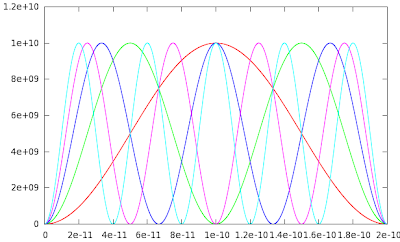One
The thing about living in a UCT+2 timezone is that by the time I see people posting about Friday, it's well into Saturday for me. Or maybe it's just a problem because I follow a lot of
international American blogs. Or maybe it's just that I'm not organised enough. At any rate, the last couple of weekends have seen me scrolling through my feedreader saying 'Oh, I guess it's too late to write one of those 7QT posts'. But it looks like I might've pulled it off this time.
Two
It's not that I'm a perfectionist or anything. I completely accept that nothing will be done 100% right. I'd just like everything to be within a few standard deviations of correct. 3-sigma certainty, for example, is 99.7%. A 0.3% error in the posting time would give me, um, less than four and a half minutes into Saturday when I could post. See? Totally not perfectionist about stuff. Not whatsoever.
Three
The holidays are too long. Now, people will object if I advocate for more term time, but I think it would be cool if we could take a couple of weeks from the long summer/winter holidays and tack them onto the ridiculously short mid-semester breaks. It might be nice to have a more balanced kind of year, but it would definitely be nice if I didn't have time to realise that the sensible thing to do with my curriculum might be to pick up Operations Research and Numerical Methods and drop Real Analysis and Algebraic Structure. I think it's worth struggling to take the courses I'll most enjoy, though.
Four
It's not that the other modules are horrid, but it feels like switching waffles and ice-cream for macaroni and cheese. Macaroni cheese is yummy and good for you, but, well, it's not waffles and ice-cream.
It's kind of hard to justify that, though. The applied maths courses would probably open more doors for me in terms of postgrad studies and the fact that they don't clash with my required physics courses is probably also significant. The pure maths courses look like more fun. And given that I don't really know what I want to do next year, I can't base my decisions on
that. But it's not worth stressing about till I'm back on campus. So really, the holidays should just be shorter.
Five
When I'm trying not to stress (for whatever collection of reasons) I read. A lot. In the last few days I've read
Northanger Abbey as well as all five books in Rick Riordan's
Percy Jackson and the Lightning Thief series. Riordan is awesome, but I couldn't help noticing that Percy dreams an awful lot in those books. Dreams are used as a really cool plot device, but given the number of throwaway comments the guy makes about his past dreams, he must have way more non-plot-related dreams than plot related ones. But he says he dreams way more at camp (where the action happens) than elsewhere. The epistemo-temporal maths doesn't work out. (It's still better than Harry Potter, where there are forty kids per year, but six or seven hundred in the school . . .) Despite such things, I love the books.
Six
No, I don't think epistemo-temporal is actually a word. But let's pretend and use our etymological detective skills, yes? Epistemo from the Greek word
ἐπιστήμη (epistēmē), meaning "knowledge". Temporal from the Latin root
tempor- meaning "time". That is, the knowledge Percy gains by dreaming doesn't seem to tie up with the amount of time he spends dreaming. And I feel totally justified in mixing Latin and Greek, since Riordan does it all the time, although we hardly noticed until it became the premise for the new
Heroes of Olympus series.
Seven
There is a blog called
Faraday's Cage is where you put Schroedinger's Cat.
It reminds me of why engineering is awesome, as well as why it frustrated me. It makes me think it doesn't really matter that much which bunch of cool courses you take for your undergrad degree: you can still shift around a bit more later if you're willing to work. It's pretty cool if you're interested in stuff like Physics/Maths/Engineering/Science Education/Gifted Child Education/Homeschooling/Cute Fluffy Animals*. I saw it
featured here and it's part of the reason
The Lost Hero is still on the to-be-read list (rather than the currently-reading list).
___
*Actually, it's pretty cool even if you aren't, but you probably have to like some of them to enjoy it.



